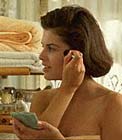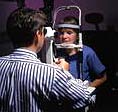Eye Care
 It’s so important to take care of your eyes, but you may not think about it very often. A good time to start is now. No matter how much makeup you put on them or how much you workout, if your eyes look tired or lack luster it will show.
It’s so important to take care of your eyes, but you may not think about it very often. A good time to start is now. No matter how much makeup you put on them or how much you workout, if your eyes look tired or lack luster it will show.
Be alert for symptoms of vision problems or visual stress including frequent headaches, tired or burning eyes, blurred vision, difficulty with distance vision, difficulty reading, or doing close work, or trouble reading the blackboard at school.
Wear proper safety eye wear when doing things like using power tools, playing sports like racquetball, basketball, karate or kick boxing.
Provide adequate lighting when reading and watching TV.
Take rest breaks from visually demanding tasks and from the computer screen.
Wear proper sunglasses then outdoors and include ultraviolet radiation protection in all eye wear.
Schedule a comprehensive eye health and vision exam every 12 to 18 months to help ensure your correct eyesight. Especially important if you wear corrective lenses.
Sunlight & Your Eyes
 Scientific researchers have been studying the long-term effects of sunlight on the human eye. A number of studies have shown a relationship between eyes that are unprotected from the sun’s rays and conditions of the eyes such as cataracts (the clouding of the focusing lens inside the eye) and macular degeneration (results in a permanent loss of central vision). Eye care professionals are recommending year-round use of proper sunglasses to block the potentially harmful ultraviolet rays of the sun.
Scientific researchers have been studying the long-term effects of sunlight on the human eye. A number of studies have shown a relationship between eyes that are unprotected from the sun’s rays and conditions of the eyes such as cataracts (the clouding of the focusing lens inside the eye) and macular degeneration (results in a permanent loss of central vision). Eye care professionals are recommending year-round use of proper sunglasses to block the potentially harmful ultraviolet rays of the sun.
Proper Nutrition For Your Eyes
Your eyes require specific vitamins and minerals to maintain optimum health and function. The typical teenage diet cannot always meet these needs in the right amounts. Current medical studies suggest that patients with several diseases of the eyes may benefit from daily dietary supplements of “antioxidant” vitamins that include: Zinc, Selenium, Vitamin A, Vitamin C and Vitamin E.
Foods That Contain High Amounts of “Eye Nutrients”
|
Zinc |
Sunflower seeds, lentils, ricotta cheese, spinach, green leafy vegetables |
|
Selenium |
Shrimp, eggs, garlic, Brazil nuts, flounder |
|
Vitamin A |
Carrots and carrot juice, sweet potato, winter squash, spinach |
|
Vitamin C |
Citrus fruit, orange juice, guava, cantaloupe |
|
Vitamin E |
Wheat germ, peanuts, eggs, cucumber, corn oil, green leafy vegetables |
Eye Specialists
Who are the eye exam people? It can be so confusing.
 Ophthalmologists: are medical doctors who are eye specialists. They diagnose, treat eye disease, perform eye surgery, give eye test and prescribe corrective lenses.
Ophthalmologists: are medical doctors who are eye specialists. They diagnose, treat eye disease, perform eye surgery, give eye test and prescribe corrective lenses.
Optometrists: are not medical doctors, but they are licensed to give eye exams and treat non-surgical eye problems. They can prescribe corrective lenses.
Opticians: fill prescriptions for glasses and contact lenses and fit you for your glasses.
The Most Common Misconception About Eyeglasses and Contact Lenses
Can Wearing Eyeglasses or Contact Lenses Weaken Your Eyes?
The most common misconception about wearing eyeglasses or lenses is that “if worn too much, they can make your eyes lazy or weak”. This is just NOT true. The goal of a perfectly prescribed vision correction depends on two things. The first is obvious: to provide CLEAR eyesight. The second is equally important but less obvious: to provide effortless visual ability.
 Many eyes see clearly without vision correction, but they may achieve this clarity by exerting unnecessary effort. For example, many cars reach high speeds with ease while others reach the same speed by exerting “pedal to the floor” effort. If your eyes routinely exert unnecessary focusing effort to see you may experience unnecessary fatigue, symptoms of eye discomfort and loss of vision. Feel confident that wearing a properly prescribed lens correction will NOT in any way hasten the natural and expected changes your eyes will undergo throughout your lifetime.
Many eyes see clearly without vision correction, but they may achieve this clarity by exerting unnecessary effort. For example, many cars reach high speeds with ease while others reach the same speed by exerting “pedal to the floor” effort. If your eyes routinely exert unnecessary focusing effort to see you may experience unnecessary fatigue, symptoms of eye discomfort and loss of vision. Feel confident that wearing a properly prescribed lens correction will NOT in any way hasten the natural and expected changes your eyes will undergo throughout your lifetime.
Read about Eye Exams and find out when you need one.
